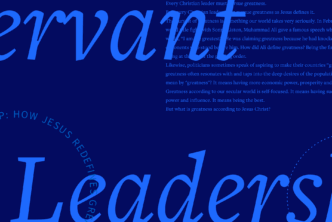What’s the difference between lament and complaint? Or is “lament” just a name we give to complaining when it’s in the Bible?
Recently I attended the national meeting of the Evangelical Theological Society, where I heard Tremper Longman deliver a paper on Psalm 46 that asked and answered that question. Longman has written a commentary on the Psalms in the Tyndale series (and numerous other commentaries); he’s also a Mobile Ed professor who has taught courses on Proverbs and Exodus and contributed to a multi-view course on creation. He has a track record of insight into the OT.
Longman noted that Psalm 46 opens with cosmic chaos and continues with social chaos. This is the stuff of later eschatological depictions: mountains moving, earth giving way; nations raging, kingdoms tottering.
But the psalm is nonetheless a “corporate psalm of confidence,” a prayer sung in the midst of chaos, Longman said. There is lament implied, because the chaos is still chaos. It isn’t enjoyable to live through. God gives us certain psalms—and books like Job and Lamentations—to communicate that “he invites our lamenting.” This phrase really struck me (and like everything in quotation marks in this post, it was taken down live, and accuracy is subject to my typing speed).
Longman then raised the question: while it’s wonderful that God invites our laments, how often does he answer them? Not all the time—so what are we supposed to do? Are we supposed to lament forever? “The general teaching of Scripture,” Longman answered, “is that a more mature level of suffering is to move from lament to confidence,” just like Psalm 46 does.
“What’s the difference between lamenting and grumbling?” asked Longman. First, in a lament, you’re talking to God, not about God—implying that you still trust God. God’s response to grumbling in Numbers is opening the ground underneath the Israelites. Lament, to be safe, should be done in the context of worship. But, Longman said, Christians have lost the tradition of lamenting in Christian worship.
Maybe Psalm 46 could help, because it puts lament and confidence together.
A hidden danger
Of course, psalms of confidence can be abused during times that properly call for lament. They can be used for a false confidence, for papering over sin. Jeremiah criticized this attitude, telling ancient Israelites that they couldn’t assume God’s presence just because they happened to live near his temple (Jer 7:1–15). Longman pointed out, “God answered the presumption of Jeremiah’s day by abandoning the temple and bringing the Babylonians to destroy it.” It would be wrong to apply Psalm 46 presumptuously in times of lament—as if this kind of confidence in victory is always appropriate. Yes, God the Divine Warrior defends Israel at many times in their history—but he also turns his power against them when they sin. We should not be so concerned to get God on our side as to get on his.
Likewise in Psalm 46, there is a famously confident statement about Jerusalem: “God is in the midst of her.” And here Longman drew a contrast to the New Testament, one designed to comfort lamenting believers: “God’s protective presence is not centered in a physical location any longer.” In the midst of our own laments, we don’t put our trust in the fact that there’s some holy site in our midst but that Jesus has died and promised to be with us and in us. When Jesus comes, he is the Divine Warrior. John the Baptist baptizes him and expects that he will gather all the chaff and burn it and take the axe to the rotten wood. Later, when in jail, John is confused because Jesus is healing the sick and preaching the gospel instead of laying the axe to the root of trees. Jesus answers by saying that he is indeed the Divine Warrior but he has intensified the battle by attacking spiritual rather than physical powers. John wasn’t wrong; he was a prophet with imperfect knowledge. He didn’t realize that Jesus was coming twice—and that it was at that second coming that Jesus would come “riding a cloud,” as Divine Warriors do when they come to execute judgment.
This is a comfort to lamenting believers: God in Christ will judge sin; those who cause believers to lament will get divine justice. Longman, in fact, pushed back against scholars who have tried to eradicate judgment from the Bible. He became a Christian, he said, because he heard that God is a judge and realized that he was on the wrong side.
The psalms were written by individuals in certain circumstances, but they are purposefully not specific to them: they were intentionally written in such a way that they can be used in other situations. Psalm 51 is a premier example. It was written by David after his adultery and murder, but it doesn’t specify either sin. David apparently wrote (and the Spirit certainly did) with countless other sins in mind. So one can fret too much about the historical circumstances of a psalm: even when we know where a psalm comes from, the writers are writing for the whole of God’s people throughout time. Psalm 46 can be misused, but it is clearly still given to lamenting believers today.
***
Pick up Dr. Longman’s Psalms volumes in the Tyndale series (and any of his other well respected commentaries). Or check out his Mobile Ed courses on Proverbs and Exodus.
Mark L. Ward, Jr. received his PhD from Bob Jones University in 2012; he now serves the church as a Logos Pro. His most recent book is Authorized: The Use and Misuse of the King James Bible (forthcoming, Lexham Press).
Get started with free Bible software
Compare translations, take notes and highlight, consult devotionals and commentaries, look up Greek and Hebrew words, and much more—all with the help of intuitive, interactive tools.






